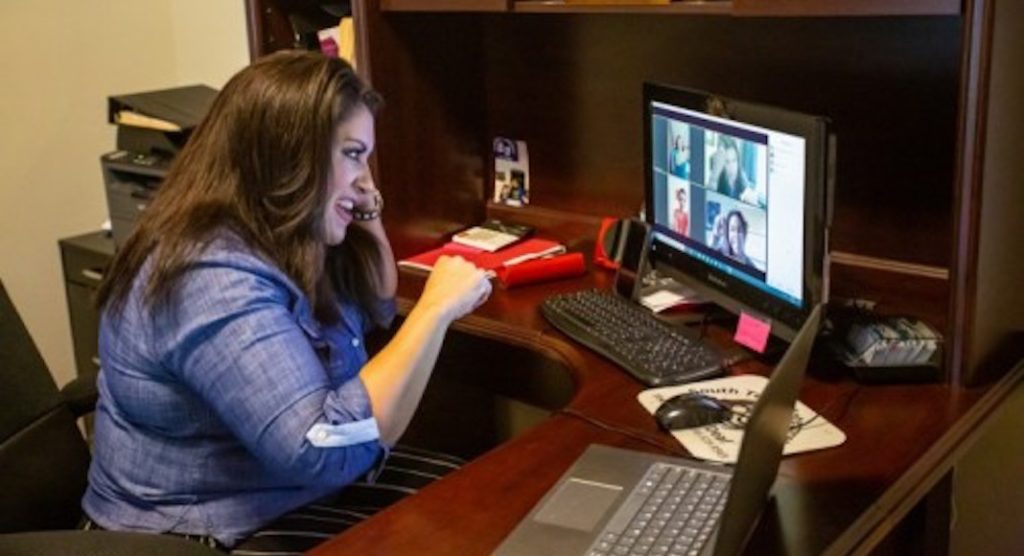
Texas Border Business
McAllen, TEXAS – Laptop, e-textbooks … and online class anxiety? Check, check … and a big red X.
At South Texas College, the fall semester is online and on point. STC’s instructors are fully confident and prepared, gearing up to continue the College’s award-winning tradition of exceptional online education. Far from having first-day jitters, students are actually excited:
“I am certainly looking forward to them,” says nursing student Rachel Batallang, who accelerated her degree plans remotely this summer with online classes at STC. “They are a great opportunity to continue learning at home while observing social distancing and keeping safe.”
South Texas College’s secret for supercharged distance learning is simple: nearly every faculty member has earned a cutting-edge online teaching certification to help make the virtual class experience virtually identical.
“We’re within a hair’s breadth of having 100 percent of our current faculty certified to teach online,” says Dr. Rachel Sale, Dean of Distance Learning.
STC employs between 1,100 and 1,200 faculty members in any given semester, and before the COVID-19 school closures, only about half were online-certified. The massive surge in the virtual ranks this spring is a testament to the teachers’ tenacity.
“I can’t tell you how proud I am of the commitment the faculty made,” says Dr. Sale. “They did the work, and it shows.”
Instructors have skillfully tackled the transition to remote learning, something that can prove challenging even for seasoned educators. Take English Professor Robin Bell, who has been teaching for 25 years — more than half of that time as an instructor at STC. Until March, she had been a traditional face-to-face teacher. Suddenly, she was part of a campus-wide movement to innovate the way instruction is delivered to students.
“The online certification process helps us think of course design from the students’ point of view,” says Bell. With feedback from Distance Learning Instructional Designers and department faculty, who went through classes “with a fine-toothed comb,” professors were able to craft exceptional remote courses.
The professional development effort is aligned with the rigorous Quality Matters rubric, an international quality control association, and the gold standard for virtual instruction. The first level of training, entitled Learning Management System Fundamentals, is a self-paced, two-hour intro to Blackboard. The next is a 10-hour LMS certification led by Distance Learning instructors to guarantee college continuity, no matter what.
“In our area, there’s a lot more than COVID. We have hurricanes,” explains Dr. Sale. “Every instructor needs to know how to function quickly in the online environment in case school is closed.”
But there’s more to remote learning than just posting info on the web. It requires careful planning and a commitment to engaging learners.
“There’s a huge difference between what you do in a face-to-face class and what you do in an online class,” says Bell. “You can’t just flip a switch.”
For one, teachers have to anticipate questions and potential technical difficulties, as well as ensure seamless workflows and navigation. Courses were completely revamped so that everything learners need would be spelled out from the very first day of class and easy to find.
“It takes effort, even for those of us who’ve been teaching for years,” confides Bell. “It is incredibly time-consuming, and it’s very labor-intensive.”
To hear her students tell it, the instructor’s hard work has been worth the effort.
“Mrs. Robin Bell … is very passionate about what she teaches and does so in a way that is interesting and easy to understand,” says Batallang, who enjoyed the combination of video instruction and online peer communication in her virtual English class this summer.
With readily available course info and office hours converted to Zoom sessions, Bell managed to stay connected to her students, never failing to provide updates and encouragement. The experience opened Batallang’s mind to the possibilities of remote learning, and she’s now convinced that “students can still efficiently learn the same information that they would in person.”
With so much focus on the logistics of remote instruction, it was important not to overlook student engagement. The online certification process devoted special emphasis to this critical aspect, exposing faculty to tools and techniques like peer review discussions and video sharing. Says Dr. Sale: “There are all sorts of unique things that our instructors do to get students to come out of their shells and interact.”
With a full summer of online courses and comprehensive training under their belts, teachers like Bell are ready to deliver, making good on South Texas College’s status as one of “The 30 Most Innovative Online Colleges in 2020,” according to Online Schools Center.
“I’ve got lots of plans for interactivity in the fall [semester], and I used a lot of these over the summer with great success,” says Bell. “I feel pretty confident.”
One of Bell’s new tools is VidGrid, an interactive video hosting platform that she uses for learning and assessments. Students can submit video assignments to demonstrate mastery of content and even interact with in-video quizzes featuring open-ended questions and calls to action.
“This is more interactive and dynamic than just asking students to watch a video and hope that they do so,” says Bell. “It keeps them engaged and active.”
Learners can also get excited about group activities in Padlet, a web-based, collaborative “bulletin board” that facilitates sharing of all kinds of content across devices. Used for icebreakers, group projects, and course-related activities, the app has served to enhance discussions and bolster online peer reviews. “Mrs. Bell certainly keeps the class interesting with her varied content,” says Batallang.
Also useful is the Blackboard app Pronto, a messaging interface that connects students with professors and classmates. Pronto also provides translation — a bonus for English as a Second Language students. This summer, South Texas College also upgraded to Blackboard Ultra, making courses even more mobile-friendly so that students can study around the clock.
“The technology does not stand in the way,” says Dr. Sale. “Courses are developed, and the entire semester is ready to go.”
For students who might be shy about virtual courses, Bell offers some sage advice: stay in steady contact with professors, forge connections with classmates, and log into class daily if possible, or at least several times a week. “If they do those things,” says the veteran professor, “they will go a long way in terms of calming the nerves.”
For Bell, what was once a daunting challenge is now a unique opportunity to improve her teaching all around. Virtual instruction has caused her content delivery to become more focused, deliberate and detailed. But the biggest advantage of online classes, according to the instructor, is the increased participation.
“I think we all wish we could be back in a face-to-face environment,” admits Bell, who particularly looks forward to translating her new knowledge into her classes on campus. “But I think the online environment also offers a lot of opportunity for creativity and connecting in different ways.”
In the meantime, Bell aspires to complete the third level of online professional development and get her course certified by Quality Matters. It’s the kind of passion, dedication and commitment to continuous improvement that is helping STC reach for Quality Matters’ “Outstanding Faculty Support” recognition, an effort involving hundreds of faculty members.
“We’re back to doing business in a normal manner. It just happens to be online,” says Dr. Sale. “We really encourage students not to waste this year … to return to school and invest in themselves.
“The people with certificates and degrees are going to be the people going to work.”












